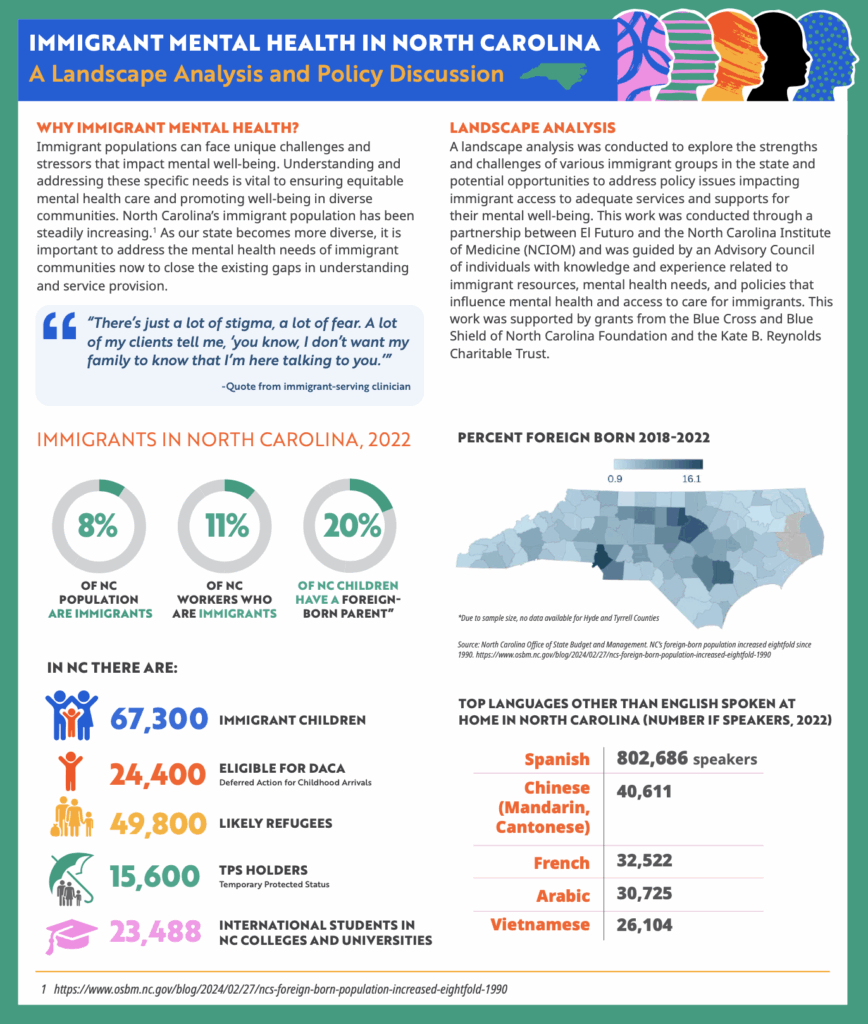2024 Landscape Analysis Report With Findings on Latine and Immigrant Mental Health and Well-Being in North Carolina
The analysis offers crucial insights into some of North Carolina’s most underserved and underrepresented populations.
Immigrant communities in North Carolina faced unique stressors that significantly impacted mental well-being, including language barriers, cultural differences, legal uncertainty, and limited access to culturally responsive care. As North Carolina’s immigrant population continued to grow, addressing these mental health needs became increasingly urgent to close longstanding gaps in understanding, services, and policy. Recognizing these challenges was essential to promoting equity and well-being in a rapidly diversifying state.
Landscape Analysis: Understanding Needs and Opportunities
To better understand immigrant mental health across North Carolina, a statewide landscape analysis was conducted to examine both the strengths and challenges of immigrant communities, as well as opportunities to address policies affecting access to mental health services and supports.
This analysis was carried out through a partnership between El Futuro and the North Carolina Institute of Medicine (NCIOM) and was guided by an Advisory Council of individuals with expertise in immigrant services, mental health, and policies influencing access to care. The work was supported by grants from the Blue Cross Blue Shield of North Carolina Foundation and the Kate B. Reynolds Charitable Trust.
Project Highlights:
El Futuro and the North Carolina Institute of Medicine (NCIOM) conducted informant interviews with key figures from various health and community organizations. The work of the ISN included engaging an Advisory Council – composed of individuals with detailed knowledge around immigrant services and mental health needs.
- Immigrant Communities of North Carolina:
Immigrants constitute 8% of North Carolina’s population, with 44% being U.S. citizens, 35% lacking legal status, and 20% of all NC children having a foreign-born parent. The top countries of origin include Mexico, India, Honduras, El Salvador, China, and Vietnam. - Economic Contributions:
Immigrants make up 14% of North Carolina entrepreneurs, generating $1.6 billion in business income, paying $9.8 billion in total taxes, and constituting 11% of the workforce. Additionally, 17% of STEM workers in NC are immigrants.
Key Findings:
The analysis identified common challenges affecting immigrant mental health, including:
- Language barriers and limited access to information
- Economic instability and unsafe working or living conditions
- Fear related to immigration enforcement
- Cultural stigma around mental health care
At the same time, immigrant communities demonstrated strong resilience through family connections, cultural traditions, and community support networks. Socioeconomic stability and supportive relationships were closely linked to better mental health outcomes.
Community-based supports, such as faith leaders, traditional healers, and trusted community figures, played an important role in bridging gaps between formal mental health systems and immigrant communities.
The Anchor Organization: NC Counts Coalition
IMHSN is now anchored by NC Counts Coalition, a statewide organization with deep experience in immigrant and refugee advocacy, coalition-building, and systems change. As IMHSN evolved, network members and funders recognized the importance of transitioning to a leadership structure that could support the network’s growth while deepening its commitment to inclusive, statewide representation. Learn more HERE
Find the Landscape Analysis in Your Own Language
Landscape Analysis for Community Leaders: Multilingual One-Pager
The Immigrant Mental Health Solidarity Network has developed a one-page summary of key recommendations from the Landscape Analysis. This resource is designed for community leaders and partners and highlights concrete actions that can be taken now to support immigrant community mental health.
The one-pager has been translated into 15 languages to ensure broad accessibility and can be shared widely across communities.



 Alvely Alcántara, LCSW
Alvely Alcántara, LCSW Rossy C. Garcia, MEd
Rossy C. Garcia, MEd  Katy Sims, MD
Katy Sims, MD  Everardo Aviles, LCSW, LCAS (Eve)
Everardo Aviles, LCSW, LCAS (Eve) As a medical anthropologist and social work researcher, Dr. Gulbas’ research embodies interdisciplinarity through the integration of applied theories of health and human development with qualitative and ethnographic methodologies. Her work seeks to understand how people—children, families, and providers—navigate complex sociocultural landscapes in the pursuit of mental health. Most of her work, to date, focuses attention on developing more robust interpretations of suicide risk. With funding from the National Institutes of Mental Health, this body of research has contributed to advancements in theoretical and empirical knowledge of the broader contexts within which youth suicide risk is situated.
As a medical anthropologist and social work researcher, Dr. Gulbas’ research embodies interdisciplinarity through the integration of applied theories of health and human development with qualitative and ethnographic methodologies. Her work seeks to understand how people—children, families, and providers—navigate complex sociocultural landscapes in the pursuit of mental health. Most of her work, to date, focuses attention on developing more robust interpretations of suicide risk. With funding from the National Institutes of Mental Health, this body of research has contributed to advancements in theoretical and empirical knowledge of the broader contexts within which youth suicide risk is situated.  R. Gabriela Barajas-Gonzalez is a developmental psychologist and an assistant professor of Population Health at NYU Grossman School of Medicine. Dr. Barajas-Gonzalez is the principal investigator of a study that examines the impact of immigration-related threat and stress on school communities. She earned a PhD in developmental psychology from Columbia University and hold a BA in human biology from Stanford University. Dr. Barajas-Gonzalez is the daughter of Mexican immigrants and a first gen college student.
R. Gabriela Barajas-Gonzalez is a developmental psychologist and an assistant professor of Population Health at NYU Grossman School of Medicine. Dr. Barajas-Gonzalez is the principal investigator of a study that examines the impact of immigration-related threat and stress on school communities. She earned a PhD in developmental psychology from Columbia University and hold a BA in human biology from Stanford University. Dr. Barajas-Gonzalez is the daughter of Mexican immigrants and a first gen college student. Dr. Parra-Cardona is an Associate Professor in the Steve Hicks School of Social Work (SHSSW) at the University of Texas at Austin. At the SHSSW, he serves as Coordinator for Mexico and Latin American initiatives. He also serves as Area Director for Research at the UT Austin Latino Research Institute. Dr. Parra-Cardona’s program of research is focused on the cultural adaptation of evidence-based parenting interventions for low-income Latinx populations in the US and Latin America.
Dr. Parra-Cardona is an Associate Professor in the Steve Hicks School of Social Work (SHSSW) at the University of Texas at Austin. At the SHSSW, he serves as Coordinator for Mexico and Latin American initiatives. He also serves as Area Director for Research at the UT Austin Latino Research Institute. Dr. Parra-Cardona’s program of research is focused on the cultural adaptation of evidence-based parenting interventions for low-income Latinx populations in the US and Latin America. Bianka Reese, PhD, MSPH is a research scientist and program evaluator specializing in adolescent and young adult sexual and reproductive health. Her previous research in the experiences of Latinx LGBTQ+ youth stems from her work as the Research and Evaluation Manager at SHIFT NC (Sexual Initiatives For Teens), where she led largescale evaluations of multilevel, community-based sexual health promotion initiatives and research projects aimed at elevating the voices of diverse youth in North Carolina. Dr. Reese is currently the Senior Research Strategist at Creative Research Solutions, LLC, an award-winning national evaluation, research, and assessment firm.
Bianka Reese, PhD, MSPH is a research scientist and program evaluator specializing in adolescent and young adult sexual and reproductive health. Her previous research in the experiences of Latinx LGBTQ+ youth stems from her work as the Research and Evaluation Manager at SHIFT NC (Sexual Initiatives For Teens), where she led largescale evaluations of multilevel, community-based sexual health promotion initiatives and research projects aimed at elevating the voices of diverse youth in North Carolina. Dr. Reese is currently the Senior Research Strategist at Creative Research Solutions, LLC, an award-winning national evaluation, research, and assessment firm. Tania Connaughton-Espino, MPH is an independent researcher focused on adolescent and young adult sexual and reproductive health. Her interest in the experiences of Latinx LGBTQ+ youth stems from her previous work with SHIFT NC (Sexual Initiatives For Teens), where she led the training and evaluation department, conducted capacity-building workshops for youth serving professionals including on the topic of how to be more affirming of LGBTQ youth, and from her extensive experience working with the Latinx population in NC.
Tania Connaughton-Espino, MPH is an independent researcher focused on adolescent and young adult sexual and reproductive health. Her interest in the experiences of Latinx LGBTQ+ youth stems from her previous work with SHIFT NC (Sexual Initiatives For Teens), where she led the training and evaluation department, conducted capacity-building workshops for youth serving professionals including on the topic of how to be more affirming of LGBTQ youth, and from her extensive experience working with the Latinx population in NC. Maru Gonzalez, EdD is an Assistant Professor and Youth Development Specialist in the Department of Agricultural and Human Sciences at North Carolina State University. Her areas of inquiry include youth development with a focus on activism, social justice, and the experiences of LGBTQ+ young people across familial, school, and community contexts.
Maru Gonzalez, EdD is an Assistant Professor and Youth Development Specialist in the Department of Agricultural and Human Sciences at North Carolina State University. Her areas of inquiry include youth development with a focus on activism, social justice, and the experiences of LGBTQ+ young people across familial, school, and community contexts.  Nayeli Y. Chavez-Dueñas, PhD
Nayeli Y. Chavez-Dueñas, PhD Hector Y. Adames, PsyD
Hector Y. Adames, PsyD